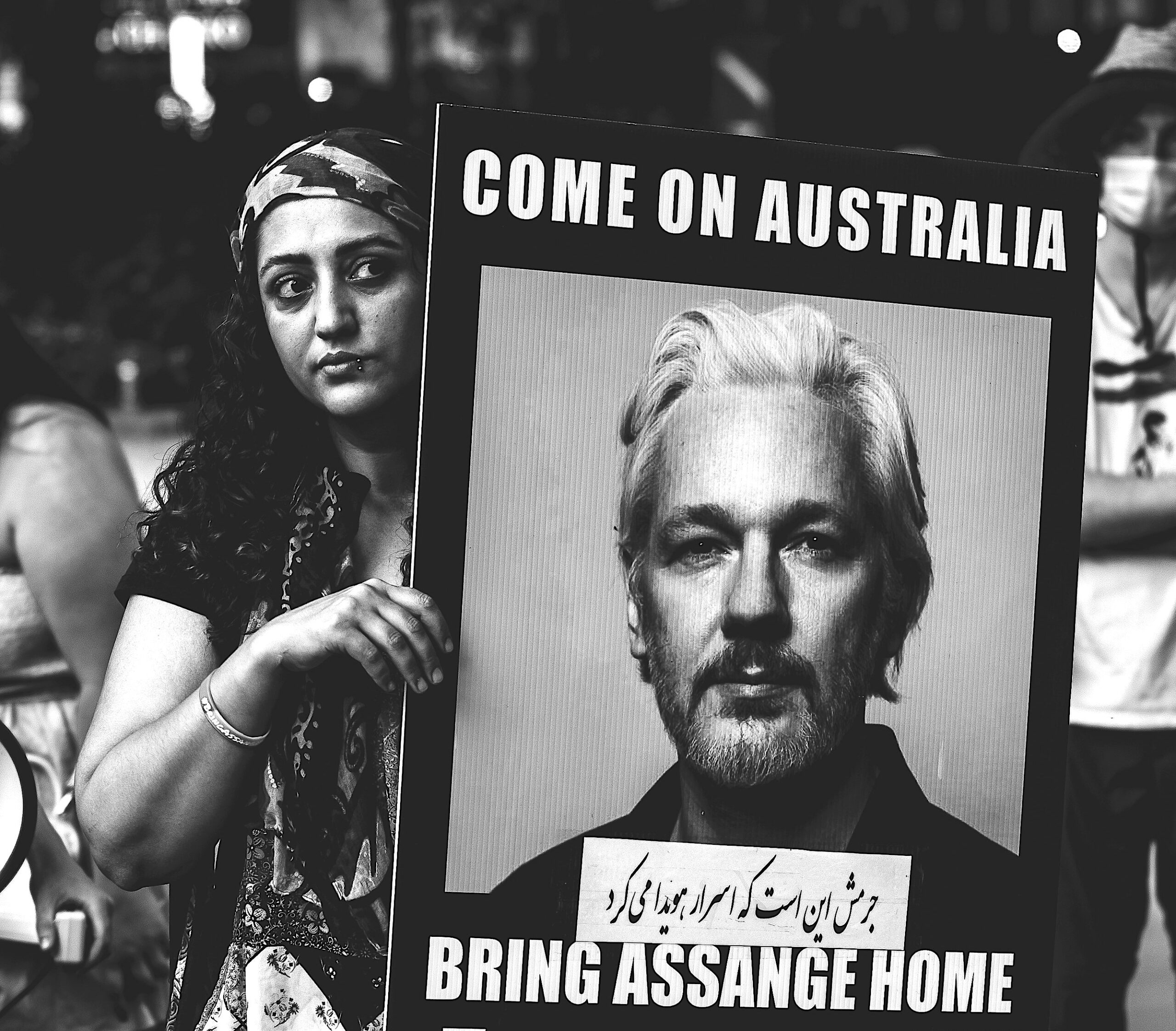
Protester in Melbourne, Australia, on Nov. 27, 2020. (Matt Hrkac, Flickr, CC BY 2.0)
By Kellie Tranter
Declassified Australia
 “Quiet diplomacy,” a “soft approach,” a “loud approach” and “avoiding megaphone diplomacy” have all been floated as strategies to “bring to an end” the case against WikiLeaks founder, Julian Assange.
“Quiet diplomacy,” a “soft approach,” a “loud approach” and “avoiding megaphone diplomacy” have all been floated as strategies to “bring to an end” the case against WikiLeaks founder, Julian Assange.
In situations like his, the best form of diplomacy is that which produces results most favourable to the citizen involved and at the same time keeps them safe and in good health.
But government documents obtained this week by Declassified Australia under the Freedom of Information (FOI) Act from the Attorney-General’s Department, indicate the new Labor government does certainly not rule out the physical extradition of Assange from the United Kingdom to the United States, nor does it give any hint about how it might deal with possible fallout from that.
Before the election, on May 15, Sen. Penny Wong told the National Press Club in Canberra, “Certainly we would encourage, were we elected, the U.S. government to bring this matter to a close, but ultimately that is a matter for the administration.”
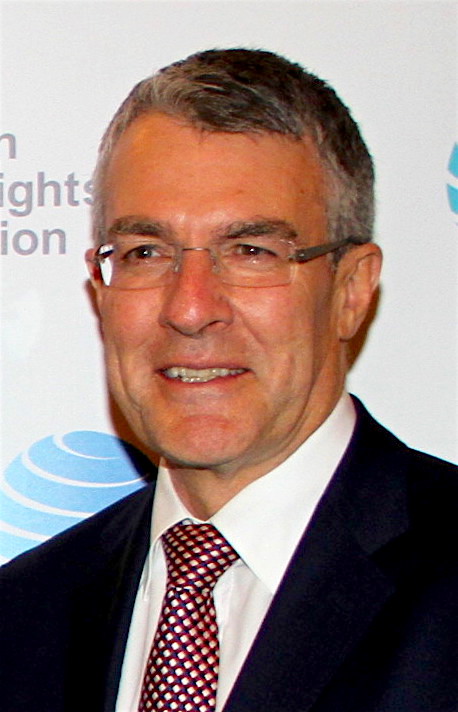
Australian Attorney-General Mark Dreyfus in 2015. (Australian Human Rights Commission, CC BY 2.0, Wikimedia Commons)
Daniel Hurst, journalist at the Guardian Australia, attempted to seek clarity on what “bring this matter to a close” meant but the question went unanswered. Now the Labor Party has been elected.
The FOI documents obtained include “Talking Points” prepared for the Attorney-General Mark Dreyfus on June 2 titled, “Julian Assange – International Transfer of Prisoners process – talking points and background.”
They point out that:
“Prisoner transfers cannot be agreed between governments in advance of a person being a prisoner (after a criminal trial, conviction and sentencing) in a particular country, and require the consent of the prisoner;
International prisoner transfers to Australia are initiated by an application from a prisoner after the prisoner has been convicted and sentenced;
If surrendered, convicted and sentenced in the US, Assange could apply under the ITP scheme to serve his sentence in Australia;
After some redactions the document continues:
“However, the UK High Court’s judgment does note that the US has provided an assurance that they will consent to Mr Assange being transferred to Australia to serve any custodial sentence on him if he is convicted.”
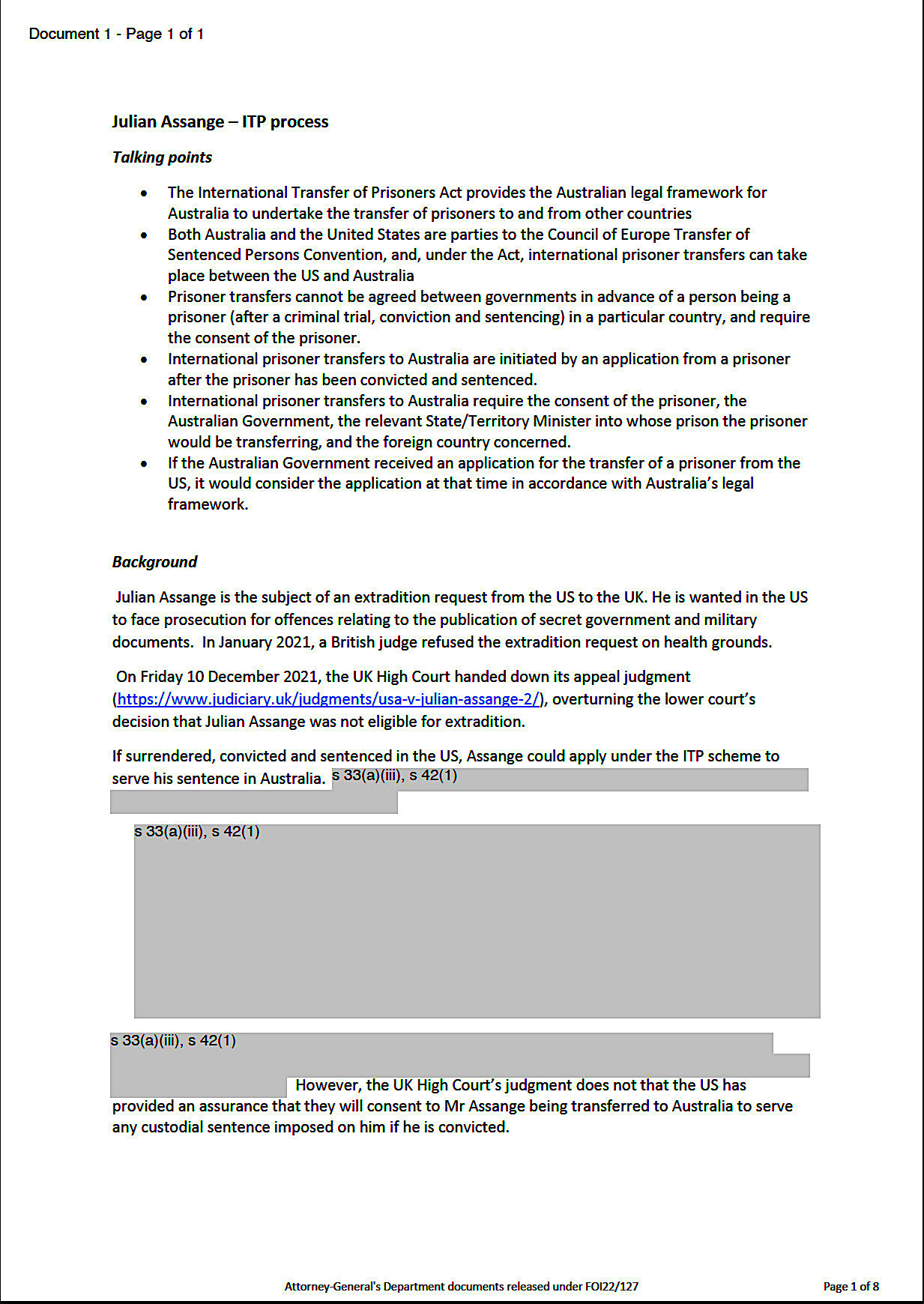
This document is a list of talking points and background information on Julian Assange and the International Transfer of Prisoners Scheme, prepared for Attorney-General Mark Dreyfus. It outlines conditions for the potential transfer of Assange from the U.S. to Australia, following extradition from the U.K., trial, conviction and sentencing in the U.S. (Document provided through FOI, Attorney-General’s Department)
The FOI documents also show that on June 8, the attorney-general, Mark Dreyfus, signed a “Ministerial Submission” titled “Julian Assange – extradition request from the United States to the United Kingdom,” which recommended that the Attorney-General note the status at the time of the Julian Assange extradition proceedings in the U.K., including that:
- The matter is currently with the UK Secretary of State for the Home Department for a decision on the extradition by 20 June 2022 (that deadline can be extended on application to the Court). [The home secretary decided for extradition on June 17.)
- The UK Supreme Court determined in March 2022 that Mr Assange is eligible for surrender to the US by refusing him leave to appeal against the High Court’s decision of December 2021.
- If Mr Assange is extradited, convicted and sentenced in the US, he may apply for transfer to Australia under the International Transfer of Prisoner’s Scheme. This will require the consent of the US and Australian authorities.
- The UK High Court’s judgment notes that the US has provided an assurance that it will consent to Mr Assange being transferred to Australia to serve any custodial sentence imposed on him if he is convicted.
Under the heading “Key Issues” the document notes:
“The UK Home Secretary is due to make a final decision on Mr Assange’s extradition to the US by 20 June. Mr Assange will have one final avenue of appeal with the leave of the High Court, otherwise he must be extradited within 28 days of the Secretary of State’s decision.”
Furthermore,
“If Mr Assange is convicted and sentenced to imprisonment in the US, it will be possible for him to apply under the ITP scheme to serve the remainder of his sentence in Australia. A transfer would also require the consent of the US, the Australian Government (through you as Attorney-General), and the relevant minister in the state into whose prison Mr Assange would be transferring.
In making any such decision, the department would provide you with advice on factors such as the extent to which the transfer would assist the prisoner’s rehabilitation, sentence enforcement, community safety and any relevant humanitarian considerations, in addition to any conditions of transfer required by the US.”
Heavily Redacted
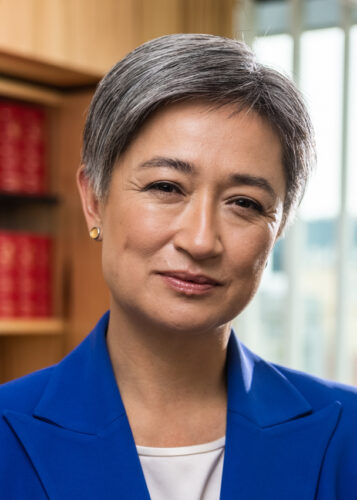
Australian Foreign Minister Penny Wong in May. (Department of Foreign Affairs and Trade, CC BY 3.0, Wikimedia Commons)
Information under the headings “Government representations and consulate engagement” and “Key risks and mitigation” are heavily redacted so one cannot tell whether the Australian government has specifically asked the United States to drop the case against Assange or taken into account things like Assange’s medical condition.
A review by the Office of the Australian Information Commissioner (OAIC) has been sought to try to get access to the redacted information.
Presumably, one of the key risks that must be considered by the Australian government is the risk of suicide.
In her judgment, presiding U.K. District Judge Vanessa Baraitser outlined the evidence provided by Michael Kopelman, emeritus professor of neuropsychiatry at King’s College London and until May 31, 2015, a consultant neuropsychiatrist at St Thomas’s Hospital, who carried out a comprehensive investigation of Assange’s psychiatric history.
He considered there to be an abundance of known risk factors indicating a very high risk of suicide including the intensity of Assange’s suicidal preoccupation and the extent of his preparations. Importantly, he stated:
“I am as confident as a psychiatrist ever can be that, if extradition to the United States were to become imminent [emphasis added], Mr Assange will find a way of suiciding.”
It is worth noting that the District Judge Baraitser accepted the medical opinion of Kopelman and found the professor to be “impartial” and “dispassionate.”
If extradition itself is a trigger for suicide, then any discussion about where Assange may be housed on U.S. soil pre- and post-trial and under what restrictive measures becomes immaterial.
The presence of large redactions in the documents may suggest that, despite the medical evidence, the Australian government has not ruled out the extradition of Assange to U.S. soil.
The imprecise language of the Labor government statements on using “quiet diplomacy” to “bring the matter to a close,” rather than clearly saying what they are seeking, may be giving false hope to the Australian and wider public.
Without putting forward its “quiet diplomacy” in non-negotiable terms to the U.S., it may be that dropping the charges won’t even be considered.
On June 17, a joint statement by Sen. Wong, now the foreign minister, and Attorney-General Mark Dreyfus noted:
“We will continue to convey our expectations that Mr Assange is entitled to due process, humane and fair treatment, access to proper medical care, and access to his legal team.
The Australian Government has been clear in our view that Mr Assange’s case has dragged on for too long and that it should be brought to a close. We will continue to express this view to the governments of the United Kingdom and United States.”
On June 28, Dreyfus told ABC Radio National’s Law Report that:
“The United States has long legislated in an extraterritorial way and I think that all other countries have understood that for a long time.
What we have in the case of Julian Assange is an Australian citizen, who is presently held in a British jail, who is subject to an extradition request made by the United States of America, which has an extradition treaty with the United Kingdom. It is not open to the Australian Government to directly interfere with either the jailing of Mr Assange in the United Kingdom, or the extradition request that’s been made by the United States to the United Kingdom.
What is available to an Australian Government, and the Prime Minister has made this very clear, and I’ve said this as well, we think that the case of Julian Assange has gone on for far too long. What is available to the Australian Government is making diplomatic representations.
But as the Prime Minister has said, those diplomatic representations are best done in private…. it’s about what we can put to the United States Government, which is the moving party here.”
What it is that can be put to the U.S. remains unclear, given the redactions in the document. If extradited from the U.K., and then tried and convicted in the U.S., Assange would face a cumulative total of up to 175 years imprisonment. His charges attract a maximum penalty of 10 years in prison on each count of violating the U.S. Espionage Act of 1917 and a maximum penalty of five years for the single count of conspiracy to commit computer intrusion. Among the diplomatic assurances the U.S. gave the U.K., which allowed the High Court in London to reverse Baraitser’s decision not to extradite, was that Assange could serve his U.S. sentence in Australia.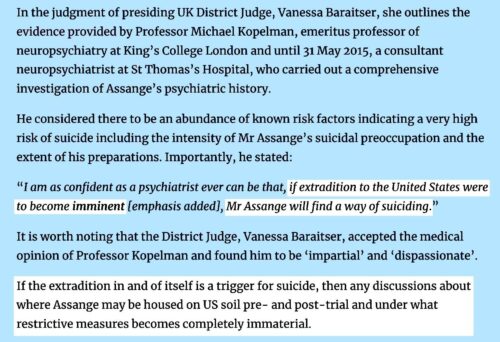
The “International Transfer of Prisoners Statement of Policy” states – among other things – that:
“A parole eligibility date will be determined as part of the sentence enforcement in Australia. The earliest possible release date in the sentencing country will be enforced as the parole eligibility date. If an earliest possible release date has not been determined by the sentencing country, Australia will propose a non-parole period that is 66 per cent of the original sentence imposed by the foreign country.
However, if the original sentence imposed by the foreign country significantly exceeds the maximum head sentence that could be imposed in Australia for a similar offence, Australia will propose a non-parole period that equates to 66 per cent of the maximum sentence that could be imposed in Australia for a similar offence.
Release on parole will be discretionary in accordance with the relevant Australian processes and laws. Where possible, the parole eligibility date will be at least 12 months before the sentence expiry date.”
The Hicks Case
Some draw parallels to the case of David Hicks, an Australian who had received militant training in Afghanistan before being detained by U.S. forces in December 2001 and was subsequently incarcerated in Guantanamo Bay detention camp from 2002 to 2007.
But they place no weight on the fact that Hicks did not want to plead guilty to any offence, in any plea deal to free him. In his book, Guantanamo: My Journey, Hicks wrote:
“If I refused to sign these new extra documents the Australian government would not take me. The consular official threatened me with this himself and [lawyer Michael] Mori agreed and said I had no choice. I did not want to sign anything or have anything to do with the commissions or plea deals, but my fear of being left behind was great. Once again I was forced into doing something I did not want to do.”
Assange will no doubt take a similarly principled approach in any negotiations and may well refuse to agree to any plea deal.
One can see why a plea to an offence carrying a lower maximum term such as conspiracy to commit computer intrusion, with a non-parole period and sentence to be served in Australia, would be attractive to a new government which wants to avoid offending an ally and says it is eager to “bring the matter to an end” on negotiated terms without Government pronouncements.
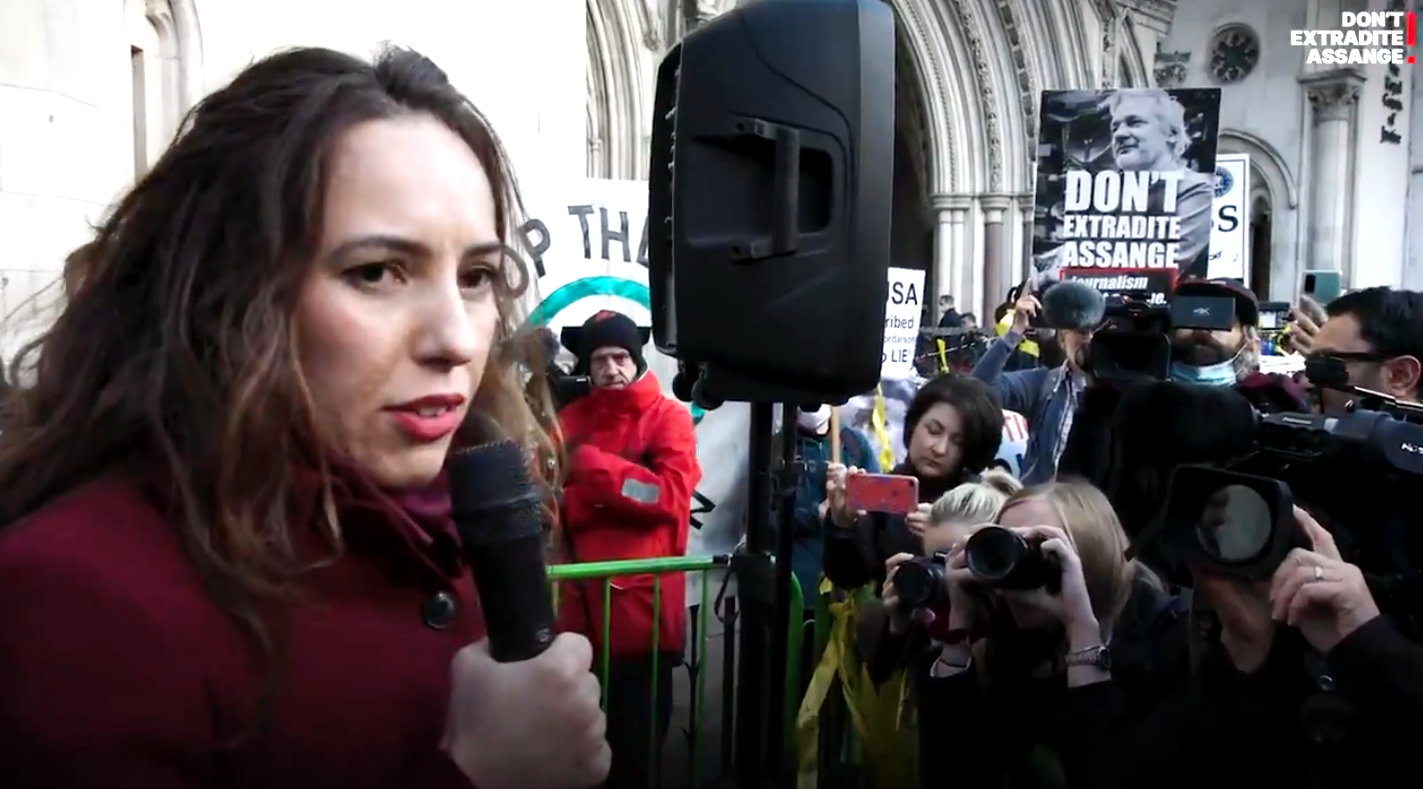
Stella Moris, Julian Assange’s wife, addressing his supporters on Oct. 28, 2021, during the U.S. appeal hearing in London. (Don’t Extradite Assange Campaign)
But this requires the Australian government to accept assurances contradicted by everything the United States has done to Assange for over a decade and by its previous failure to comply with its own assurances in other cases; to ignore the medical opinion of Professor Kopelman and the risk of Assange’s extradition-related suicide; to turn a blind eye to the fact that the U.S. has not adopted or incorporated into its domestic law the Rome Statute of the International Criminal Court against the “crime against humanity” of “torture” and to assume that Assange himself will co-operate in the process.
Moreover, Greg Barns SC, adviser to the Australian Assange Campaign, makes a critical point. He told Declassified Australia that,
“The Assange case is unique. One of the ways in which that is the case is the attempted extraterritorial use of the U.S. Espionage Act. The U.S. is seeking to establish a precedent where it could seek to extradite any journalist anywhere in the world for disclosure of U.S. information.
If Australia were to sanction a ‘deal’ whereby Assange pleaded guilty to a charge in exchange for an Australian served sentence, it would be endorsing that approach.”
At the end of the day, the Australian government should come clean with the Australian people (and to Assange supporters around the world) about what the representations made to the United States, or “quiet diplomacy,” actually involve.
Surely, we are entitled to see that the government has done as much for securing Assange’s freedom from Australia’s alleged “great ally” as it did for other “political detainees” of non-allied regimes, such as Peter Greste jailed in Egypt and Kylie Moore-Gilbert jailed in Iran.
“Quiet diplomacy” does not mean weak diplomacy.
Is Australia urging the United States in non-negotiable terms to give priority to human rights and press freedom over an intelligence-driven vendetta or over U.S. domestic political considerations, and to drop the case against Assange once and for all?
Kellie Tranter is a lawyer, researcher, and human rights advocate. She tweets from @KellieTranter
This article is from Declassified Australia.
The views expressed are solely those of the author and may or may not reflect those of Consortium News.

The Powers’ that Be, “War on Terra,” rolls on: “We have all kinds of ways to attain our ends.” (Repeat the Line)
For instance, an Extradition Treaty, in effect. Consequently, for the heartless, ball-less wonders down under…..”Mums” the word: “It is not open to the Australian Government to directly interfere with either the jailing of Mr Assange in the United Kingdom, or the extradition request that’s been made by the United States to the United Kingdom,”
“We the People” call Bull-$hit!!!
“The best favour is to rescue the one most in need,” i.e., Julian Assange.
Everybody knows, Julian Assange did NOTHING wrong!!! YET, “Julian Assange faces extradition and state murder while the war criminals he exposed walk free.”
“We the People,” ask the Powers that Be, to “FREE, Julian Assange.” STOP the Persecution. STOP the Extradition. STOP the Disappearance of Julian Assange. When Julian Assange lives free, “We” will all Live Free.
AND, “The Powers’ that Be” future power in punishing any journalist, publisher or whistleblower revealing the inner machinations of their War Machine, will be Non-Existent. The rotten, inhumane crimes against humanity, will be crimes of the past!!! “Everybody, one. Everybody, two. Everybody, FREE”
The information released by the Australian government would appear to suggest that It is quite prepared to see the judicial process in both the U.K. and U.S. reach a inevitable conclusion and then see how subsequent matters develop.
What it has failed to do however, is to act on behalf of Australian citizen Julian Assange, who according to the Special Rapporteur on Torture, Nils Melzer has assessed that “under the “Istanbul Protocol” which is the international standard for identifying symptoms of torture, Assange had suffered and continues to suffer torture.” Melzer also stated, that “there has been extensive collusion between intelligence services of various democratic states, including the United States, United Kingdom, Sweden and Ecuador, in order to not prosecute Assange, but actually persecute him.” He further stated that the case is “being pursued for ulterior motives – not in order to enforce the law but for political purposes, and therefore it is actually a persecution.”
The Australian government is well aware that the Judicial systems in both the U.K. and the U.S has been irreparably corrupted in order to prosecute Julian, to make an example of him, to silence other journalists from producing materials that those in power didn’t want the us to know.
Noam Chomsky has stated, “Julian Assange has created a great crime of exposing power to sunlight which may cause power to evaporate if the population grasps the opportunity to become independent citizens of a free society, rather than the subject of a master who operates in secret.”
The U.S. succeeded, on appeal, in persuading a willing U.K. High Court by offering assurances that if Mr Assange is convicted and sentenced to a term of imprisonment, he will not be held at the U.S. Administrative Maximum Facility (ADX) in Florence, Colorado, but at the same time retains the power to designate Mr Assange to ADX in the event that, “after entry of this assurance, he was to commit any future act that then meant he met the test for such designation.”
Considering its previous actions, it is entirely conceivable that the U.S. could easily manufacture an incident, thereby negating the package of assurances which was so eagerly accepted by the High Court.
Knowing all of this, the Australian government is quite prepared to accept a corrupt judicial process which will inevitably find Julian Assange guilty of espionage but by then their cowardly failure to act on behalf of a heroic citizen will be judged as too little and too late.
Australia has a government that’s running scared of Murdoch newspapers.
I’d hoped for more but it’s behaviour on domestic matters like mask mandates in the face of overloaded hospitals, it’s inability to call an end to new oil and gas, Richard Marles the new Defence Minister who appears diametrically opposed to the diplomacy of Foreign Minister Wong;
What hope “they’ll grow a pair” in freeing Assange?
Ever since Gough Whitlam got kicked out for either wanting to get rid of Pine Gap or wanting to get a fair deal for Australian mining resources, it has been pretty clear we are just another American puppet.
Never has there been published a truer statement than this one. Now with Quad and AUKUS on the way to making the pacific a war zone, for US hegemonic ambitions. The US is already up for 20 million deaths so its soon to add to that disgraceful total in yet another part of the world.
The parroting of the “we would encourage, were we elected, the U.S. government to bring this matter to a close” statement by numerous ALP MPs – even post election – is one of acquiesce to whatever the US may decide to do.
It’s an ALP escape-clause that permits them to cover themselves regardless of what happens to Julian.
If the US wants to lock him up and throw away the keys that can be interpreted as “bringing this matter to a close.”
One aspect of this case that Nils Melzer repeatedly reaffirms in his ‘Trial Of Julian Assange’ is that Wikileaks exposed war-crimes committed by the USA; crimes that have not been properly investigated nor punished, hence culpability and responsibility goes all the way to the Oval Office: Bush, Obama, Trump & Biden have all failed their legal responsibilities under international laws.
No wonder some US officials and ex-secretary of state have stated that they want Julian dead, droned.
Mark Dreyfus (Australian Attorney General) has stated that Australia cannot interfere or intervene in US law, and in saying so he is quite happy and content with the US breaching international war-crimes law.
Regarding the potential suicide of Julian Assange, why are any of these countries making such a big deal out of it?….One would think they’d be overjoyed were this to happen….Or would his enemies prefer torturing him to death slowly?
Empire. No Empire in world history has ever passed the test of time.
“Quiet diplomacy?” Give me a break. Something tells me Australia will do nothing for Assange. When Caitlin Johnstone, an Australian citizen, was asked why she’s always writing about the crimes of the US when she’s Australian, she said something along the lines of, “I am an American. I’m just cutting out the middle-man.” Australia does what it’s US rulers want, and that includes Labor of course.
Seems to me the evidence points to the fact that Australia doesn’t have the balls to protect one of its own from the bogus charges from a bogus nation that thinks it’s the ruler of the world.
Like Boy Shrub said, “Yer either fer us, or yer against us,” and the Australian government isn’t about to become an enemy of the US Government by standing against the criminals who run the show.
Amerika – Where hideous war criminals run free and those who report their atrocious crimes are prosecuted to the full extent of the pseudo-law.
Oh, yes please!!! Aussies…don’t offend a murderer.
Assange is guilty of being a human being, bearing witness to immoral acts pogroms, torture programmes, murder rape buggery sodomy of men women and children by a degenerate government, called American.
That has no bearing of which country he comes from, that he has the strength of character as a reporter, to do his job!
The removal of “Seven” prime minister in ten years, anstrailia is a plaything of the English government and associated degenerates that’s holding Mr Assange without charge in a high security prison illegally. Illegally because he has committed no crime! The truth, isn’t a crime!
Sadly, Highlander, we’re talking about the US, where truth IS a crime. Obama, Mr. Constitutional Scholar, prosecuted more whistle blowers than all other presidents combined. Daniel Hale, who reported that Obomba’s drone wars slaughtered 90% civilians, is serving 45 months in prison under Biden’s watch. Speaking truth to power has Edward Snowden exiled to Russia. Speaking the truth is a dangerous thing here in the land of “free speech.” Even this news site is threatened for not going along with the lies of the state.
Assange faces the possibility of a sentence of 175 years in the US. Assuming Australia does not have the kind of overly long sentences the US does, if Assange were to be extradited, would he still be serving 175 years?
Australia is a shameless timid colony of Washington.
Well put. Our new PM’s statement about ‘quiet diplomacy’ is a classic example of timidity. Subservience, insecurity, and fear of the bully. I think this is the Australian government wanting to be seen doing something, but it is too fearful of sticking its head out and upsetting its US masters. Anyway, the US cannot be trusted to honour any undertaking, so I don’t have high hopes for Assange being allowed to serve his sentence here.
This case against him is vindictive, intentionally cruel and is intended to send a message to all journalists around the world. If the US gets its dirty hands on him, then they’ll likely want to make a public example of him to deter other journalists.